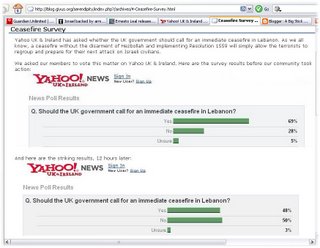Since the invasion of Afghanistan five years ago, an assumption has developed that it has been example of a successful mission. In some ways, perhaps it has been. The key objective, the capture of bin Laden, was never achieved but it seems this is no barrier to success as far as the US government is concerned. And it is true that their have been some positive developments.
What seems to have gone almost unnoticed over the last five years is that huge swathes of the country have remained utterly lawless and ungovernable. In many ways, Afghanistan is the perfect example of theatricality over thoroughness. The "invade, declare victory, move on to the next invasion" strategy was certainly superficially impressive for a time, but behind the scenes, things look a whole lot different.
Blair's decision to send a small number of UK troops into the lawless chaos is proving to be a bloody behind the scenes documentary into the anarchy which still reigns there.
Today, the British military has been
defending their decision to call in an air strike in the Afghan town of Nawzad. Before going any further, it should be noted that the British military ethos is significantly different from that of the Americans. In very broad terms, US forces are trained to apply overwhelming force, as much as is available, in order to achieve their objectives. This sort of training has its advantages in conventional warfare but it is ill-suited to counter-insurgency fighting and the US military is widely considered to be very bad at it, at least partly for this reason (widely considered by those who study this topic outside the US anyway). In essence, the US military minimises the risk to their troops by seeking to apply overwhelming force, preferably from long range. In other words, in seeking to reduce the risk to themselves, they actually increase the risk to the civilian population around them. They call the results of this collateral damage. The dead civilians are in no position to disagree with this description although their friends and family might. I don't think you need me to spell out the implications this has on the ability to win hearts and minds. "What's that? We've killed your mother? Sorry about that. Would you like a lollipop?"
British forces, on the other hand, are trained to respond proportionately. They are far less likely, for example, to call in a air strike against a lone sniper just because an air strike is theoretically available. They're more likely to consider the wider destruction this might cause and instead adopt less devastating tactics which will almost certainly be more dangerous to them personally. This is rather heroic in some ways and it can, apart from anything else, serve as an inspiration to the general population to see these men put themselves in harms way in an attempt to reduce the possibility of civilian casualties. Obviously, this approach is more likely to win hearts and minds. For this reason, British forces are generally thought to be quite good at counter-insurgency warfare.
Given the above, the decision to call in an air strike on Nawzad was unlikely to have been taken lightly. The proportionality ethos means that UK troops are only going to call in an air strike in a populated area as an absolute last resort when they feel themselves to be in grave danger.
The BBC report confirms as much:
UK commanders said they had been under constant attack for the past two weeks and the Taleban fighters were close to overrunning the base when the US air strike was called in.
If you are in any doubt as to whether UK troops have the resources available to do their job in Afghanistan, read that sentence again. After two weeks of constant attack on a fortified position, the UK military feared they were going to be overrun by the Taleban.
This wasn't a surprise attack which caught them on the hop, it wasn't a sneaky ambush, it was a sustained action. Why, over the course of the previous two weeks of constant attack, was the base not reinforced to ensure that it'd be secure? The only conclusion which can be drawn is that the reinforcements are just not available. The British military presence in Afghanistan is not able to fully defend the positions it takes up, never mind do all those other security and reconstruction projects they're supposed to be doing.
Whatever you think about the mission in Afghanistan (and please don't assume you know what I think because I'm leaving that for another day), it cannot be right to send our troops out there into the chaos of southern Afghanistan in such a circumstance. They are hopelessly exposed, concerned almost exclusively with force (ie their own) protection. What benefit can possibly be served by this?
And what of the results of the airstrikes? There's a video report of the aftermath of the bombings on the
BBC report which is worth watching if you haven't seen it. The British military has said that there is no evidence of any civilian casualties as a result of the dropping of three 500lb bombs on a town centre. Clearly, unless they searched through all that rubble in the middle of a hot zone while no-one was looking, there's no way that they can know whether there's any evidence of civilian casualties or not. The military denial is a standard knee-jerk response, utterly meaningless.
You and I do not know whether someone's daughter, or grandfather, or best friend is buried under that rubble and we probably never will. If people have been killed, no memorials will be built, no respectful silence will be held. The deaths of those we claim to be helping are of curiously little interest to us; their lives are certainly nowhere near as important as those of British citizens and soldiers.
The truth is, we have two choices in Afghanistan; we can do it properly or not do it at all. Some sort of bodged up halfway house is just going to get more British soldiers and Afghan civilians killed. This bodge, of course, is a direct result of our government's decision to start a totally unrelated and unnecessary war in Iraq. And Tony tells us he supports the troops. It'd be laughable, except that people are dead.
Tags: News, Politics, Afghanistan







